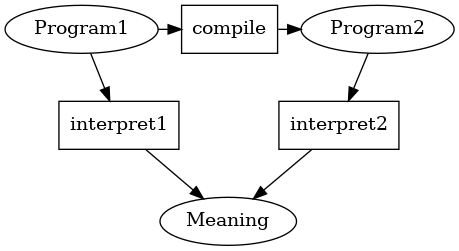This is not a Compiler
What’s the difference between a compiler and an interpreter? An interpreter “runs” a program, whereas a compiler transforms a program in one language into an equivalent program in another language.
The slogan is: interpreters reveal meaning; compilers preserve meaning.
In other words, it doesn’t matter which path you take in the following directed graph, the meaning is the same:

(That is, the diagram “commutes”.)
That’s really all you need to know. And if you find that definition satisfactory, read no further!
Fuzzy Boundaries
The potential problem here is that we’ve just defined something. We’ve drawn a boundary around certain things and called them “compilers”, and another boundary around other things and called them “interpreters”.
And at some point in history we really started asking too much of our definitions. We forgot that—like clouds and seashores—they have fuzzy boundaries. And the definition I’ve given above is no exception. In this post we’ll look at some of the “fuzz” along its fringes.
The Big Picture
We’ll write a program that “compiles” Scheme to JavaScript by simply embedding a Scheme interpreter (written in JavaScript) alongside the program we asked it to compile. Here’s what that looks like:
/**
* Transform a Scheme program into an equivalent JavaScript program by cheating.
* Specifically, just bundle the source code of a Scheme interpreter along with
* the provided program.
*/
function compile(program) {
return `
// What follows is the source code for a Scheme interpreter, written in
// JavaScript:
function interpret(program) {
// ...
}
// Now just call "interpret" on the program we're supposed to compile:
interpret(\`${program}\`);
`;
}
To keep this note short and to the point, I’ve already prepared a small (“pocket-sized”) Scheme interpreter. The source code is available here. I saved this to a file named interpret.js:
To define compile, we’re going to need to paste this interpreter source code
inside a template string.
So we need to take care to escape all backticks (`), dollar signs ($) and
escape characters (\).
This is easy enough to do manually, but we can also automate it with a little
script.
I saved the following to a file named quote.js:
process.stdin
.setEncoding('utf-8')
// Replace backticks (`), dollar signs ($), and escape characters (\) with an
// escaped version, e.g. $ -> \$.
.map(chunk => chunk.replace(/`|\$|\\/g, c => `\\${c}`))
.pipe(process.stdout);
and then produced an escaped version of interpret.js via:
$ node quote.js < interpret.js > interpret-escaped.txt
Defining compile
The moment has arrived.
I created a new file named compile.js, and copied the escaped interpreter
source into the body of a function named compile.
I also included the critical invocation of the (quoted) interpret function on
the source of the program to be “compiled”:
function compile(source) {
const interpreterSource = `
function lex(source) {
const tokens = [];
let pos = 0;
function skipWhile(pred) {
...
...
...
`;
return `
${interpreterSource}
interpret(\`${source}\`);
`;
}
Finally, to make our “compiler” a little more ergonomic, let’s read input
programs from stdin and write the compiled output to stdout:
const fs = require('fs');
function compile(source) {
// ...
}
const source = fs.readFileSync(0, 'utf-8');
fs.writeFileSync(1, compile(source));
The full listing is available here.
We can now compile Scheme files, like basic.scm:
;; basic.scm
(define +
(lambda (m n)
(cond
((zero? m) n)
(else (add1 (+ (sub1 m) n))))))
(define *
(lambda (m n)
(cond
((zero? m) 0)
(else (+ n (* (sub1 m) n))))))
(define map
(lambda (fn l)
(cond
((null? l) (quote ()))
(else (cons (fn (car l))
(map fn (cdr l)))))))
(define ^2 (lambda (n) (* n n)))
(print (map ^2 (quote (1 2 3 4 5))))
via:
$ node compile.js < basic.scm > basic.js
This produces a JavaScript file basic.js which, when run, results in:
$ node basic.js
(1 4 9 16 25)
Is this a Compiler?
Yes! Well, at least according to the definition above, since:
# Follow the horizontal arrow in the diagram above, compiling my-prog.scm to
# my-prog.js.
$ node compile.js < my-prog.scm > my-prog.js
# Now follow the right branch, interpreting my-prog.js. In this case, `node` is
# `interpret2`.
$ node my-prog.js
and
# Follow the left branch, interpreting my-prog.scm. In this case, `scheme` is
# `interpret1`.
$ scheme my-prog.scm
produce the same result.
But is it really a compiler? I would have expected a compiler to transform the Scheme program:
(print (+ 1 2))
into something like:
console.log(1 + 2);
but instead it produces this monstrosity:
function lex(source) {
const tokens = [];
let pos = 0;
function skipWhile(pred) {
// ...
// ...
interpret(`(print (+ 1 2))`);
This is not a Translation
We expect a compiler to know something about both its source and target languages. But our compiler doesn’t really know anything about Scheme. It’s as if I claimed to know both French and English, but whenever you asked me to translate a bit of French I simply wrote down:
The English translation of "<French-phrase>".
For example, I’d translate apporte-moi un croissant as:
The English translation of "apporte-moi un croissant".
Note that this is:
- A sentence in English.
- Whose meaning—in English—is the same as the meaning—in French—of apporte-moi un croissant.
But “executing” it requires having someone who speaks French available “at runtime”.
Conclusion
So is compile.js a compiler, or not? It doesn’t matter! It’s a happy little clam living somewhere in the intertidal zone, resisting our futile attempts to put in a box.